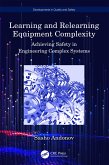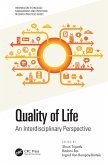Nancy J. Stone, Alex Chaparro, Joseph R. Keebler, Barbara S. Chaparro, Daniel S. McConnell
Introduction to Human Factors (eBook, ePUB)
Applying Psychology to Design, 2nd Edition
63,95 €
63,95 €
inkl. MwSt.
Sofort per Download lieferbar

32 °P sammeln
63,95 €
Als Download kaufen

63,95 €
inkl. MwSt.
Sofort per Download lieferbar

32 °P sammeln
Jetzt verschenken
Alle Infos zum eBook verschenken
63,95 €
inkl. MwSt.
Sofort per Download lieferbar
Alle Infos zum eBook verschenken

32 °P sammeln
Nancy J. Stone, Alex Chaparro, Joseph R. Keebler, Barbara S. Chaparro, Daniel S. McConnell
Introduction to Human Factors (eBook, ePUB)
Applying Psychology to Design, 2nd Edition
- Format: ePub
- Merkliste
- Auf die Merkliste
- Bewerten Bewerten
- Teilen
- Produkt teilen
- Produkterinnerung
- Produkterinnerung

Bitte loggen Sie sich zunächst in Ihr Kundenkonto ein oder registrieren Sie sich bei
bücher.de, um das eBook-Abo tolino select nutzen zu können.
Hier können Sie sich einloggen
Hier können Sie sich einloggen
Sie sind bereits eingeloggt. Klicken Sie auf 2. tolino select Abo, um fortzufahren.

Bitte loggen Sie sich zunächst in Ihr Kundenkonto ein oder registrieren Sie sich bei bücher.de, um das eBook-Abo tolino select nutzen zu können.
This textbook introduces readers to the innovative field of human factors psychology, offering real-world examples illustrating how experimental findings are used to improve the design of tools and environments used daily. This edition provides updated text, examples, pedagogical boxes, references, and an expanded instructor's manual.
- Geräte: eReader
- mit Kopierschutz
- eBook Hilfe
Andere Kunden interessierten sich auch für
![Introduction to Human Factors (eBook, PDF) Introduction to Human Factors (eBook, PDF)]() Nancy J. StoneIntroduction to Human Factors (eBook, PDF)63,95 €
Nancy J. StoneIntroduction to Human Factors (eBook, PDF)63,95 €![Human Factors in Engineering (eBook, ePUB) Human Factors in Engineering (eBook, ePUB)]() Human Factors in Engineering (eBook, ePUB)48,95 €
Human Factors in Engineering (eBook, ePUB)48,95 €![Introduction to Human Factors for Organisational Psychologists (eBook, ePUB) Introduction to Human Factors for Organisational Psychologists (eBook, ePUB)]() Mark W. WigginsIntroduction to Human Factors for Organisational Psychologists (eBook, ePUB)49,95 €
Mark W. WigginsIntroduction to Human Factors for Organisational Psychologists (eBook, ePUB)49,95 €![Industry 4.0 and Climate Change (eBook, ePUB) Industry 4.0 and Climate Change (eBook, ePUB)]() Industry 4.0 and Climate Change (eBook, ePUB)54,95 €
Industry 4.0 and Climate Change (eBook, ePUB)54,95 €![Learning and Relearning Equipment Complexity (eBook, ePUB) Learning and Relearning Equipment Complexity (eBook, ePUB)]() Sasho AndonovLearning and Relearning Equipment Complexity (eBook, ePUB)48,95 €
Sasho AndonovLearning and Relearning Equipment Complexity (eBook, ePUB)48,95 €![New Perspectives in Behavioral Cybersecurity (eBook, ePUB) New Perspectives in Behavioral Cybersecurity (eBook, ePUB)]() New Perspectives in Behavioral Cybersecurity (eBook, ePUB)89,95 €
New Perspectives in Behavioral Cybersecurity (eBook, ePUB)89,95 €![Quality of Life (eBook, ePUB) Quality of Life (eBook, ePUB)]() Quality of Life (eBook, ePUB)48,95 €
Quality of Life (eBook, ePUB)48,95 €-
-
-
This textbook introduces readers to the innovative field of human factors psychology, offering real-world examples illustrating how experimental findings are used to improve the design of tools and environments used daily. This edition provides updated text, examples, pedagogical boxes, references, and an expanded instructor's manual.
Dieser Download kann aus rechtlichen Gründen nur mit Rechnungsadresse in A, B, BG, CY, CZ, D, DK, EW, E, FIN, F, GR, HR, H, IRL, I, LT, L, LR, M, NL, PL, P, R, S, SLO, SK ausgeliefert werden.
Produktdetails
- Produktdetails
- Verlag: Taylor & Francis eBooks
- Erscheinungstermin: 26. Dezember 2024
- Englisch
- ISBN-13: 9781040230503
- Artikelnr.: 72523904
- Verlag: Taylor & Francis eBooks
- Erscheinungstermin: 26. Dezember 2024
- Englisch
- ISBN-13: 9781040230503
- Artikelnr.: 72523904
- Herstellerkennzeichnung Die Herstellerinformationen sind derzeit nicht verfügbar.
Nancy J. Stone received her Ph.D. in experimental psychology from Texas Tech University, USA. She created and taught the undergraduate Human Factors course at Creighton University. Nancy is a Fellow of the Human Factors and Ergonomics Society, and currently serves on the Executive Council. She served as the Educational Technical Group (ETG) Program Chair and the ETG Chair. She also served on and then became Chair of the Education and Training Committee of the Human Factors and Ergonomics Society. Her involvement in human factors education led to her invited article on human factors education in the Special 50th Anniversary issue of Human Factors. Her research is in the areas of environmental design, teamwork, and student learning.
Alex Chaparro received his Ph.D. in experimental psychology from Texas Tech University, USA, and completed a postdoc at Harvard University in the departments of Psychology and Applied Sciences. He is a Professor in the Department of Human Factors and Behavioral Neurobiology at Embry-Riddle Aeronautical University. He has taught human factors courses at the undergraduate and graduate level and is a member of the Human Factors and Ergonomics Society. His research concerns the effects of distraction and aging on driving performance.
Joseph "Joe" R. Keebler received his PhD in Applied/Experimental Human Factors Psychology from the University of Central Florida, USA. Joe currently serves as an Associate Professor of Human Factors at Embry Riddle Aeronautical University. Joe's work is aimed at experimental and applied research, with a specific focus on training and teamwork in military, medical, and consumer domains. He has partnered with multiple agencies and institutions in his career, with most projects aimed at the implementation of human factors in complex, high-risk systems, to increase safety and human performance. This work includes over 100 publications, book chapters, proceedings papers, and presentations.
Barbara S. Chaparro has a PhD in Experimental Psychology from Texas Tech University, USA. She is a Professor in the Human Factors and Behavioral Neurobiology Department and Head of Research in User eXperience (RUX) Lab at Embry-Riddle Aeronautical University. Her research interests include the study of factors that influence the user experience (UX) of products and systems, the investigation of usability assessment methods, and the efficacy of augmented/mixed reality devices and applications.
Daniel S. McConnell has a Ph.D. in Sensory Psychology from Indiana University Bloomington, USA, and completed a postdoc at the Institute for Research in Cognitive Science at the University of Pennsylvania. He is currently a Senior Lecturer in Psychology and Co-Director of the Technology and Aging Laboratory at the University of Central Florida. His research focuses on the visual control of reaching, the analysis of human movement kinematics, and human motor performance in the context of technology use.
Alex Chaparro received his Ph.D. in experimental psychology from Texas Tech University, USA, and completed a postdoc at Harvard University in the departments of Psychology and Applied Sciences. He is a Professor in the Department of Human Factors and Behavioral Neurobiology at Embry-Riddle Aeronautical University. He has taught human factors courses at the undergraduate and graduate level and is a member of the Human Factors and Ergonomics Society. His research concerns the effects of distraction and aging on driving performance.
Joseph "Joe" R. Keebler received his PhD in Applied/Experimental Human Factors Psychology from the University of Central Florida, USA. Joe currently serves as an Associate Professor of Human Factors at Embry Riddle Aeronautical University. Joe's work is aimed at experimental and applied research, with a specific focus on training and teamwork in military, medical, and consumer domains. He has partnered with multiple agencies and institutions in his career, with most projects aimed at the implementation of human factors in complex, high-risk systems, to increase safety and human performance. This work includes over 100 publications, book chapters, proceedings papers, and presentations.
Barbara S. Chaparro has a PhD in Experimental Psychology from Texas Tech University, USA. She is a Professor in the Human Factors and Behavioral Neurobiology Department and Head of Research in User eXperience (RUX) Lab at Embry-Riddle Aeronautical University. Her research interests include the study of factors that influence the user experience (UX) of products and systems, the investigation of usability assessment methods, and the efficacy of augmented/mixed reality devices and applications.
Daniel S. McConnell has a Ph.D. in Sensory Psychology from Indiana University Bloomington, USA, and completed a postdoc at the Institute for Research in Cognitive Science at the University of Pennsylvania. He is currently a Senior Lecturer in Psychology and Co-Director of the Technology and Aging Laboratory at the University of Central Florida. His research focuses on the visual control of reaching, the analysis of human movement kinematics, and human motor performance in the context of technology use.
Contents
Preface to Second Edition
Preface to First Edition
About the Authors
1. Introduction to Human Factors.
2. Research Methods.
3. Visual, Tactile, and Olfactory Displays.
4. Audition and Vestibular Function.
5. Methods of Evaluation.
6. Attention, Memory, and Multi-Tasking.
7. Decision-Making.
8. Motor Skills and Control.
9. Anthropometry and Biomechanics.
10. Environmental Design.
11. Human Error: Causes and Prevention.
12. Future Trends in Human Factors.
Index
Preface to Second Edition
Preface to First Edition
About the Authors
1. Introduction to Human Factors.
2. Research Methods.
3. Visual, Tactile, and Olfactory Displays.
4. Audition and Vestibular Function.
5. Methods of Evaluation.
6. Attention, Memory, and Multi-Tasking.
7. Decision-Making.
8. Motor Skills and Control.
9. Anthropometry and Biomechanics.
10. Environmental Design.
11. Human Error: Causes and Prevention.
12. Future Trends in Human Factors.
Index
Contents
Preface to Second Edition
Preface to First Edition
About the Authors
1. Introduction to Human Factors.
2. Research Methods.
3. Visual, Tactile, and Olfactory Displays.
4. Audition and Vestibular Function.
5. Methods of Evaluation.
6. Attention, Memory, and Multi-Tasking.
7. Decision-Making.
8. Motor Skills and Control.
9. Anthropometry and Biomechanics.
10. Environmental Design.
11. Human Error: Causes and Prevention.
12. Future Trends in Human Factors.
Index
Preface to Second Edition
Preface to First Edition
About the Authors
1. Introduction to Human Factors.
2. Research Methods.
3. Visual, Tactile, and Olfactory Displays.
4. Audition and Vestibular Function.
5. Methods of Evaluation.
6. Attention, Memory, and Multi-Tasking.
7. Decision-Making.
8. Motor Skills and Control.
9. Anthropometry and Biomechanics.
10. Environmental Design.
11. Human Error: Causes and Prevention.
12. Future Trends in Human Factors.
Index







